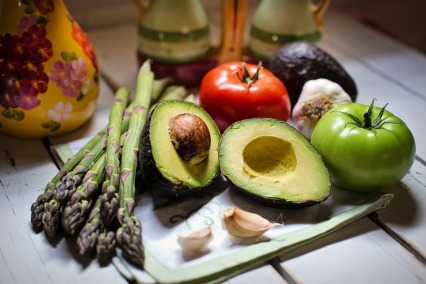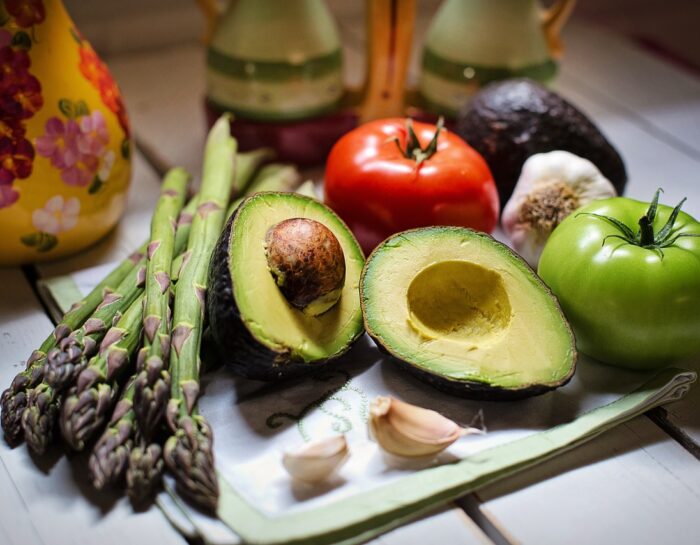By Chef K.T. Murphy
There are plenty of trendy diets out there for high protein diets, however, this can lead to high levels of cholesterol if you’re choosing the wrong protein types. However, if you want to maintain a healthy level of LDL cholesterol there are plenty of appropriate proteins that you can choose, and it doesn’t have to be animal protein.

There are wide varieties of plant foods that offer high levels of protein. If you are dealing with high cholesterol you may want to have a discussion with your doctor, before you make any drastic changes to your diet.
Protein In Your Diet
When it comes to a healthy balanced diet, the number of calories that come from protein should be anywhere from 10 to 35%. Protein offers 4 calories for every gram, so if you consume 2,000 calories every day, between 200 and 700 of those calories should be from protein. This works out to around 50 to 175 grams of protein every day.
A high protein diet will encourage you to consume the high end of those numbers, and often more.
Types of Cholesterol
We know that cholesterol is necessary for our body. It provides our cell walls with structure, and works to produce certain hormones. Our livers produce all the cholesterol we need, only 25% of the cholesterol in our bodies comes from the food that we consume.
A poor diet can cause high levels of cholesterol, which can leave you at an increased risk of heart disease. LDL is the bad cholesterol, and high levels of LDL clogs arteries.
HDL is the good cholesterol, and transports the LDL to the liver, and the liver is where the cholesterol is broken down. Your cholesterol should be under 200mg. LDL, and 100mg. HDL, but be above 60mg.
Fats In A High Protein Diet
High protein foods like dairy, poultry, and beef contain trans and saturated fats. Both of these are harmful, and may result in an increase in your cholesterol. Trans fats are particularly bad for health, according to the Mayo Clinic, they raise LDL levels, and lower HDL levels, which leave you at great risk for heart disease.
Saturated fats shouldn’t be more than 10% of your total daily calories, and trans fats should be limited to just 1%. Therefore, if you consume 2,000 calories every day, you should only consume 2g of trans fat and 22g of saturated fat every day.
Healthy Protein Sources
You should avoid unhealthy fats by opting for healthy protein choices. Poultry contains trans and saturated fats, however your best way to limit the levels you consume are by choosing turkey or chicken breast. Opt for low fat milk, and choose lentils, whole grains, beans, and tofu. These will provide you with all the protein your diet needs, without the excessive levels of fat.
Harvard Medical School suggests that two great examples are soya foods and nuts. Soya foods are low in saturated fats and help lower your cholesterol. The proteins in soya can also influence how our body regulates our cholesterol levels. In fact, according to Heart Org just 15g of soya protein in your daily diet can reduce your cholesterol by 6%.
Soya foods include soya alternatives to meat, nuts, desserts, milks, and yogurt, as well as tofu and edamame beans.
How can you work in 15 grams of soya protein every day? Any one of the following will do:
- 55 grams of tofu
- A handful of roasted edamame beans.
- 100 grams of soya mince
- 2 250ml glasses of soya milk
Nuts are seriously rich in protein, as well as fiber, vitamins, and minerals. You can reduce your cholesterol by around 5% by include around 30-35mg of nuts every day.
Any of the following will do:
- 35 pistachios
- 32 almonds
- 28 peanuts
- 28 cashews
- 21 macadamias
- 21 hazelnuts
- 11 walnut halves
- 10 brazil nuts
- 4 chestnuts
All the best, Good Food makes For Better Decisions.
Chef Murph
Tags: Articles, Chef K.T. Murphy, chef keith murphy, chef murph, Chef Murph TV, Chef Murphy, Chinese, food, Foodist Networks, Global Fusion Americana, Recipes


